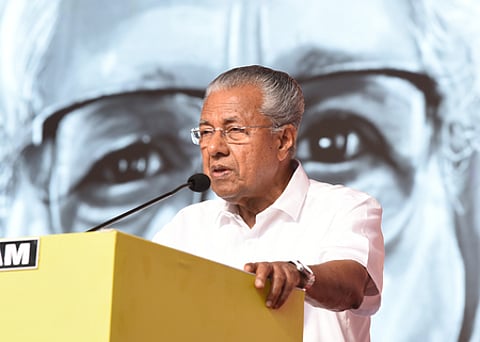

MADURAI: The ongoing CPM Party Congress on Friday made call to defend Kerala’s left government which has been fighting a fiscal blockade imposed by the BJP government at the Centre. The party meet on Friday adopted a resolution in this regard.
Moved by West Bengal secretary Mohammed Salim and backed by Tripura secretary Jitendra Choudhury, the resolution pointed at the distinctive features of the LDF government including opposing the Hindutva ideology and providing an alternative to neo liberal policies. Union government has been conducting false, baseless and malicious propaganda against the state government, alleged the resolution.
The resolution said the BJP government at the Centre has virtually imposed a fiscal blockade against the state. It also alleged that the opposition Congress has also joined the destabilization attempt.
“The alternative development policies pursued by successive Left Governments in Kerala have focused on strategy of redistribution for inclusive growth. Land reforms have been implemented. Trade unions and minimum wage laws have ensured the highest wages. Government policies have ensured universal education, health care and social security. Absolute poverty will be eradicated in 2025-26. Kerala has ensured a decent and better life for its ordinary citizens.
Kerala leads India in social and welfare achievements and its GDP growth during the past three decades is higher than the country’s growth. Currently it is trying to address the challenge of educated unemployment. It would require a transformation of the technological base of the economy into one based on advanced scientific knowledge and high productivity. To achieve it, Kerala`s knowledge and skill intensive industries must become an attractive investment destination. A new generation of start-up enterprises must mushroom. Kerala should become a knowledge economy.
The state is taking major strides under the present LDF government to overcome the key impediments to such a transformation through the following initiatives: (a) Making Kerala an attractive investment destination, (b) Overcoming the infrastructure deficit through extra budgetary resource mobilization by special SPVs, (c) Revamping the higher education sector, and (d) Launching Knowledge Kerala People's Campaign to skill the students and the unemployed.
The above paradigm shift does not imply that the state would move away from its redistributive strategy of development. The public sector units, public education and public health will be strengthened. There will be no abridgement of democratic rights or labour rights. Democratic decentralization and participation will continue to characterize our interventions in the social and small-scale sectors. The fight against all forms of caste and gender discrimination and for secular and scientific values will continue.
It is precisely such an outcome that the BJP-NDA regime at the Centre wants to prevent. Besides deploying the agency of Governor for administrative manipulations and undermining the legislative power of the state by withholding assent to bills, the Union government is systematically squeezing the fiscal space of the state government.
The Finance Commission’s share of tax devolution to Kerala has declined from 3.9 per cent during the 10th UFC period to 1.9 per cent during the current 15th UFC. The state’s share of the centrally sponsored schemes is only 1.6 per cent. Its share in the CAPEX is only 1.1 per cent. It has received virtually nothing from the special packages announced for different states. In 2024-25 the Union government`s total transfer to all the state governments in India was Rs 25 lakh crore. With 2.8 per cent of the population share, proportionately Kerala should have received Rs 70,000 crore. Actually, the transfers to the states were only Rs 35,000 crore, only half of what was its due.
The Union government has also arbitrarily reduced the normal borrowing of the state government on the pretext that the capital borrowing made by KIIFB, a SPV similar to the National Highway Authority of India, is equivalent to indirect borrowing by the state. Worse, the central government decided to give retrospective effect to its new rule on extra budgetary borrowing by the state. As a result, during the past three years more than Rs 10,000 crore have been reduced from the state’s market loans. All this has pushed the state government’s finances into a crisis.
To cover up its discrimination, the Union government and its followers are conducting completely false, baseless and malicious propaganda against the state government,” said the resolution.